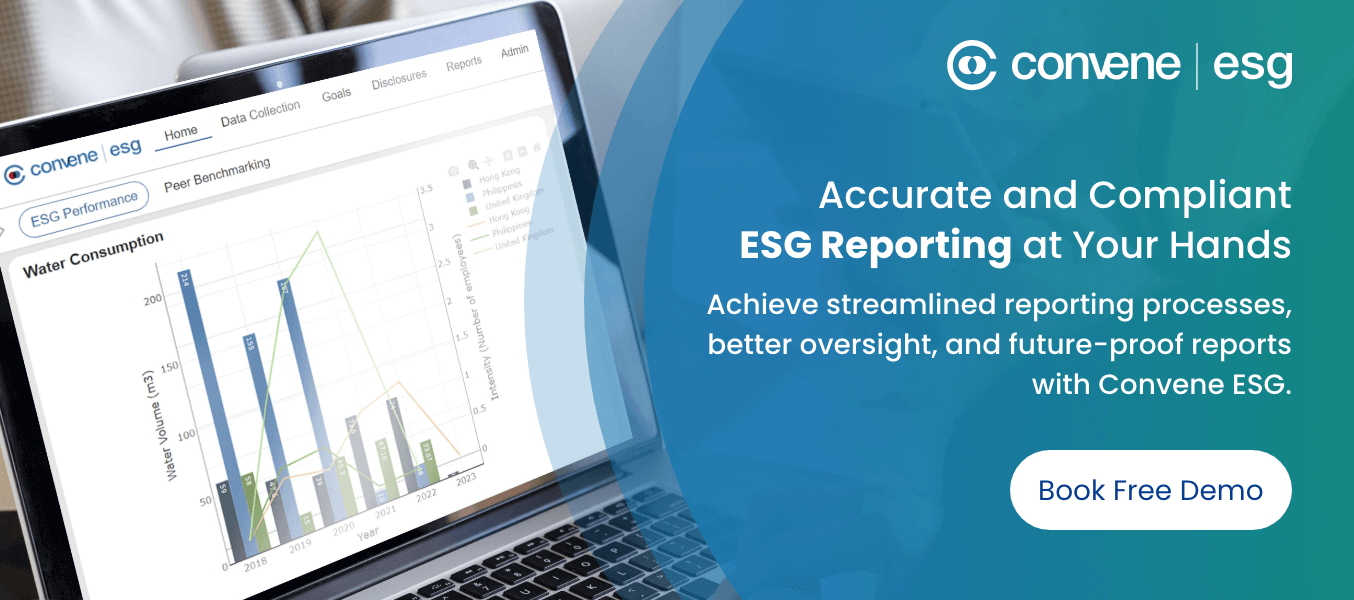Mandatory Environmental, Social, and Governance (ESG) reporting is standard in many countries, with significant variation between industries and regions. Research by the Swiss Finance Institute shows that mandatory ESG reporting regulations are more likely to be adopted by countries with common law origins and higher per capita carbon emissions.
Comply-or-Explain vs Mandatory ESG Reporting
ESG disclosure regulations can be broken down into mandatory or “comply-or-explain” models. To date, mandatory regulations have largely applied to organisations meeting specific criteria, such as public corporations or firms listed under major stock exchanges.
Under comply-or-explain models, companies are expected or required to comply with national ESG reporting standards, or to provide detailed, considered reasons for why they haven’t.
Territories and Countries with Mandatory ESG Reporting

At present, 29 countries and territories maintain some degree of mandatory ESG disclosure regulation. Each national or territorial policy differs in the degree to which institutions must disclose ESG metrics and which companies qualify for the more stringent standards.
The United States
The US Securities and Exchange (SEC) maintains a comply-or-explain regime with some mandatory reporting features. New York Stock Exchange (NYSE) rules also require listed companies to publish codes of corporate behaviour and ethics. In March 2022, the SEC submitted a proposal for the Enhancement and Standardization of Climate-Related Disclosures for Investors to adapt to an ever-changing market and provide comparable, traceable data for stakeholders.
The United Kingdom
Under UK law, certain companies, such as those with over 500 employees or with annual turnovers of more than £500 million, are required to disclose climate-related financial information in annual strategic reports. Other guidelines, such as Section 172 of the Companies Act, require directors of UK companies to consider factors such as employees’ rights and disclosures, community relations, along with anti-corruption and anti-bribery issues.
Malaysia
Malaysia introduced mandatory ESG reporting standards for all publicly listed companies in 2016. These cover responsibilities, including the establishment of equity, diversity, and human rights policies, anti-bribery and anti-sexual harassment policies, and sustainable development practices.
Furthermore, recent proposals have been made to gradually align Malaysian ESG reporting standards with those laid out by the Financial Stability Board’s Task Force on Climate-Related Financial Disclosures (TCFD).
Hong Kong
Hong Kong maintains a blanket “comply-or-explain” system, although firms falling under the Main Board Listing Rules are held to certain mandatory ESG reporting standards. These include: board statements regarding the oversight, management, and progress review of ESG matters; explanations on how the reporting principles of materiality, quantitative, and consistency were applied in the preparation of the ESG reports; and the reporting boundaries listing the included entities and the reasons for their inclusion.
Singapore
The Singapore Exchange Ltd. established a comply-or-explain ESG reporting framework in 2016, while mandatory reporting rules came into effect for certain listed companies in January 2022. Singapore ESG disclosure rules also stipulate that directors leading Singapore-listed companies must attend sustainability training, certain entities from various industries will be required to present climate-related disclosures as of 2023 as well as their board diversity policy.
The Philippines
Since 2019, The Philippines has maintained national ESG disclosure regulations under Memorandum Circular 4. According to these guidelines, publicly listed companies must submit an annual report on their ESG performance.
Relevant laws include standards for establishing relationships with stakeholders, including communities in which companies operate, employees, customers, creditors, investors, suppliers, and local government. The Philippine Securities and Exchange Commission (SEC) also strongly recommends that listed companies adopt reporting practices to publicise their sustainability policies in ESG matters.
The Move Toward Global ESG Reporting Standards
While several countries have incorporated measures requiring mandatory ESG disclosures, it has not yet reached a global forum. Steps have been taken to create a worldwide framework for ESG reporting standards due to demands for standardisation of the ESG reporting process. This comes as a result of inconsistencies from participating entities and a bid for transparency and accountability.
One such step came in November 2021, when the IFRS Foundation announced the establishment of the International Sustainability Standards Board (ISSB). The ISSB will generate global sustainability standards for investors in 140 participating countries. The IFRS has also merged the International Integrated Reporting Council (IIRC) and the Sustainability Accounting Standards Board (SASB), two previously independent frameworks, into the Value Reporting Foundation.
Given that the IFRS’ existing standards have been fully adopted in over 144 jurisdictions, it seems likely that this will be the template for future developments in a global ESG reporting framework.
ESG Reporting Software Handles Compliance for You

With mandatory ESG reporting soon becoming a necessary measure, companies need to familiarise themselves with the latest ESG criteria and obligations. The simplest solution is to dedicate staff and resources to checking ESG requirements and recommended frameworks in any country where a company wishes to conduct business. However, this can be a complicated, costly, and error-ridden process.
A more effective approach can be to use ESG reporting software to ensure compliance and avoid costly mistakes. Combining a full suite of convenient, easy-to-use digital reporting software, Convene ESG empowers companies to comply with all mandatory ESG reporting frameworks and codes so users can focus on providing valuable products and resources in markets near and far.
Ready to find out more? Head on to this page to know more about the advanced features of Convene ESG — primed to elevate your ESG reporting.















